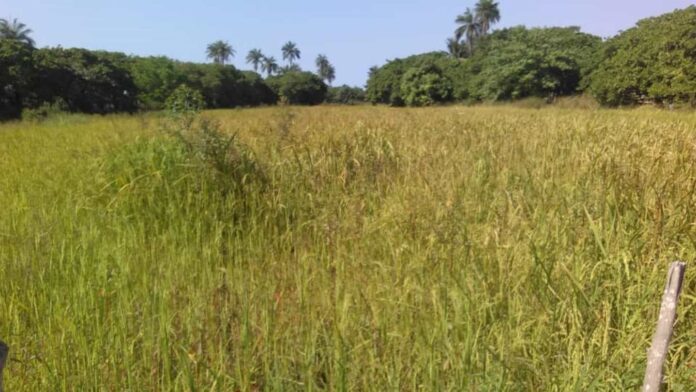By Nelson Manneh
For eight years, the women of Bwiam and its surrounding villages have left their rice fields untended. The fields, known locally as “faros,” once formed the backbone of their agricultural livelihoods. But since 2017, when ECOMIG forces were stationed at the entrance of Bwiam, the women have stayed away—gripped by an enduring sense of unease.
Their absence from the land is not the result of direct confrontation. ECOMIG forces, deployed as part of the regional military mission in The Gambia, insist they have no quarrel with the farmers and wish only for them to return. But the women’s fear is deep-rooted, shaped by past threats and the lingering presence of armed patrols near their homes.
“We abandoned the lands not because we wanted to, but because we faced a lot of threats in the past,” said Mariatou Bojang, a resident of Bwiam. “The ECOMIG forces never told us to leave, but we feel uncomfortable farming there now.”
In a region still contending with the legacy of former President Yahya Jammeh’s rule, the military footprint remains a source of tension. The ECOMIG base in Bwiam stands as a reminder of a tumultuous past. Their patrols extend into nearby border villages, and while there is no ongoing conflict, the memories of gunfire and military activity loom large.
“Whenever we see their vehicles, especially around the border, we feel very uncomfortable,” said Arafang Colley, a farmer traveling to Kappa Village. “Their presence alone is intimidating.”
In 2023, this reporter visited the fields and spoke to both the women and ECOMIG officers. The military personnel stationed in Bwiam at the time expressed a desire to foster cooperation.
“We want to collaborate with these women so they can return to their farms,” one officer said. “Most of us are farmers too, and we would love to see them working on the land again.”
Yet, the women remain reluctant. Some say they will only return if the military is relocated. Others have abandoned farming altogether.
“There is no fighting anymore, but the past still haunts us,” said Fanta Bojang, a local villager.
ECOMIG officers, for their part, say they have integrated into the community. One officer pointed out that schoolchildren sometimes stop by their base for meals, a sign, he suggested, that relations with the villagers remain amicable.
“We see them as our relatives,” he said. “We are here to protect them.”
But in Bwiam, the rice fields tell a different story. They remain overgrown and silent, the women who once cultivated them still watching warily from a distance.




















